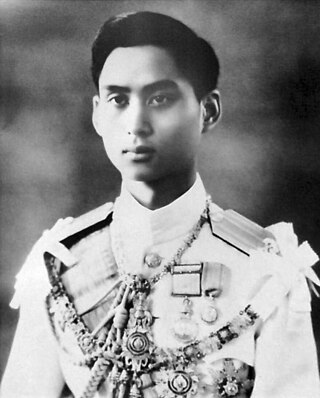
Ananda Mahidol was the eighth king of Siam from the Chakri dynasty, titled Rama VIII. At the time he was recognised as king by the National Assembly in March 1935, he was a nine-year-old boy living in Switzerland. He returned to Thailand in December 1945, but six months later, in June 1946, he was found shot dead in his bed. Although at first thought to have been an accident, his death was ruled a murder by medical examiners, and three royal aides were later executed following very irregular trials. The mysterious circumstances surrounding his death have been the subject of much controversy.

Phra Bat Somdet Phra Nangklao Chaoyuhua, personal name Thap, also styled Rama III, was the third king of Siam under the House of Chakri, ruling from 21 July 1824 to 2 April 1851.
The provinces of Thailand are administrative divisions of the government of Thailand. The country is divided into 76 provinces proper, with one additional special administrative area. They are the primary local government units and act as juristic persons. They are divided into amphoe (districts) which are further divided into tambon, the next lower level of local government.

Mae Fah Luang - Chiang Rai International Airport is in Ban Du subdistrict, Mueang Chiang Rai district, Chiang Rai province in northern Thailand. The airport is about 8 km from the city center. Since 1998, it has been managed by the Airports of Thailand Public Company Limited (AOT). In 2013, the airport handled over 1,000,000 passengers and 7,000 passenger flights. The airport had international flight facilities and served a few international routes to Macau, Singapore, Kuala Lumpur, Kunming, Haikou, Hangzhou, Changsha, Xishuangbanna, Shenzhen, and Chengdu, all of which were suspended due to the COVID-19 pandemic. Since travel restrictions were imposed in China, there have been no international commercial flights connecting Chiang Rai to the global market. Thus, the airport has been seeking other possible routes to connect to such as to South Korea.

Prajadhipok was the seventh king of Siam from the Chakri dynasty, titled Rama VII. His reign was a turbulent time for Siam due to political and social changes during the 1932 Siamese revolution. He is to date the only Siamese monarch of the Chakri dynasty to abdicate.
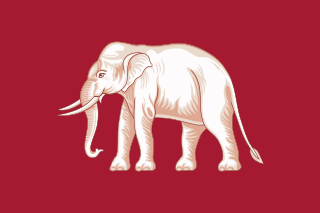
The Rattanakosin Kingdom, the Kingdom of Siam, or the Bangkok Empire, were names used to reference the fourth and current Thai kingdom in the history of Thailand. It was founded in 1782 with the establishment of Rattanakosin (Bangkok), which replaced the city of Thonburi as the capital of Siam. This article covers the period until the Siamese revolution of 1932.
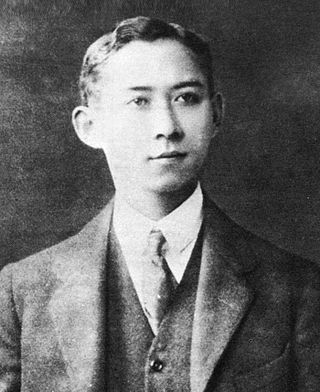
Mahitala Dhibesra Adulyadej Vikrom, the Prince Father, formerly Prince Mahidol Adulyadej, Prince of Songkla or Mahidol Songkla, was the father of King Ananda Mahidol and King Bhumibol Adulyadej of Thailand, and the paternal grandfather of King Vajiralongkorn. He was also regarded as the father of modern medicine and public health in Thailand. He also founded the House of Mahidol or the present Royal Family of Thailand. His two sons reigned for more than eight decades, longer than the Ibn Saud siblings of Saudi Arabia, and the Nahyan siblings of Abu Dhabi.

Galyani Vadhana, Princess of Naradhiwas was a princess of Thailand and the elder sister of King Ananda Mahidol and King Bhumibol Adulyadej. She was also a direct granddaughter of King Chulalongkorn, and aunt of King Vajiralongkorn.

Buddhism in Thailand is largely of the Theravada school, which is followed by roughly 93.4 percent of the population. Thailand has the second largest Buddhist population in the world, after China, with approximately 64 million Buddhists. Buddhism in Thailand has also become integrated with folk religion (Bon), Hinduism from millennia of Indian influence, and Chinese religions from the large Thai Chinese population. Buddhist temples in Thailand are characterized by tall golden stupas, and the Buddhist architecture of Thailand is similar to that in other Southeast Asian countries, particularly Cambodia and Laos, with which Thailand shares cultural and historical heritages. Thai Buddhism also shares many similarities with Sri Lankan Buddhism. Thailand, Cambodia, Myanmar, Sri Lanka and Laos are countries with Theravada Buddhist majorities.

Suankularb Wittayalai School literally Rose Garden College is an all-boys secondary school for grades 7 through 12 in Bangkok, Thailand. Founded by King Chulalongkorn in 1882 as a peer's school, its purpose was to educate the children of nobility and the royal household. Suankularb is the oldest public secondary school in the country. Suankularb alumni include eight Prime Ministers of Thailand, nine Supreme Court Chief Justices, five attorneys general, two Fortune Global 500 chief executives, scholars, as well as a number of prominent politicians and businessmen. Suankularb is a member of Jaturamitr group of the four oldest boys' schools in Thailand. Suankularb consists of 11 campuses all over Thailand.
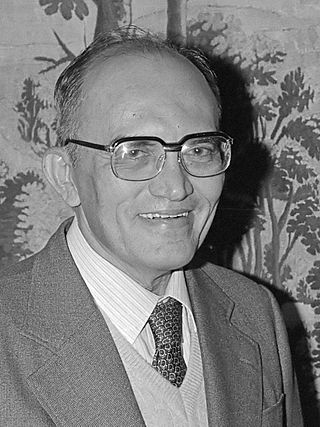
Siddhi Savetsila was a Thai air force officer and politician. After finishing his military career with the rank of air chief marshal, he served as the foreign minister of Thailand from 1980 to 1990. In 1991, he became a member of the Privy Council of King Bhumibol Adulyadej. He was the president of the united nations security council in 1985 with Mom Luang Birabhongse Kasemsri.

Prince Nakkhatra Mangala, 2nd Prince of Chanthaburi, was the eldest son of Kitiyakara Voralaksana, 1st Prince of Chanthaburi and Princess Apsarasaman Kitiyakara. He was the father of Queen Sirikit, father in-law of late Thai King Bhumibol Adulyadej and maternal grandfather of the current King Vajiralongkorn.

Kitiyakara Voralaksana, 1st Prince of Chanthaburi was a Prince of Siam, a member of the Siamese Royal Family. He originated the House of Kitiyakara (ราชสกุลกิติยากร). His descendants use this royal surname. He is the paternal grandfather of Queen Sirikit, consort of King Bhumibol Adulyadej. Through Sirikit he is also the maternal great-grandfather of King Maha Vajiralongkorn, who has been King of Thailand since 2016.

The monarchy of Thailand is the constitutional form of government of the Thailand. The king of Thailand is the head of state and head of the ruling Royal House of Chakri.
The coronation of the monarch of Thailand is a ceremony in which they are formally consecrated by anointment and crowning. The ceremony is divided into two main events: the coronation rites and the celebration of the Assumption of the Residence. The coronation rites are a blend of Hindu and Buddhist traditions dating back several centuries. The rites included the purification bath of the king, the anointing of the king, the crowning of the king, and the investiture of the royal regalia, the royal utensils, and the royal weapons of sovereignty. The Assumption of the Residence is a private housewarming celebration by members of the royal family at the Grand Palace.

Chaophraya Thiphakorawong was a Thai aristocrat, government official, and scholar.

Mom Luang Dej Snidvongs was a Thai honorary academic. He was the President of the Privy Council of Thailand to King Bhumibol Adulyadej and Governor of the Bank of Thailand in 1949 to 1952. He was given the title of Luang Dejsahakorn.

Wat Pradu Chimphli is an ancient civilian Thai Buddhist temple in Wat Tha Phra Subdistrict, Bangkok Yai District, Bangkok's Thonburi side. The temple is situated rim Khlong Bangkok Yai, where is confluence of khlongs (canal) Phasi Charoen, and Bangkok Yai.
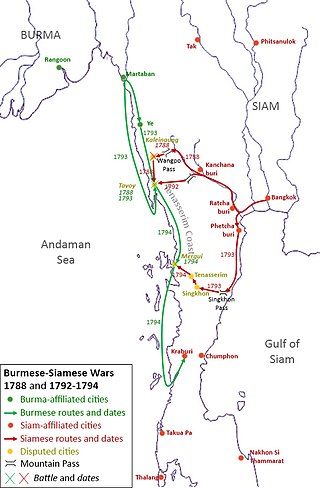
The Burmese–Siamese War (1792–1794) or the Siamese Invasion of Tavoy was the conflict between the Kingdom of Burma under Konbaung dynasty and the Kingdom of Siam under the Chakri dynasty over the town of Tavoy and the Tenasserim Coast.

















